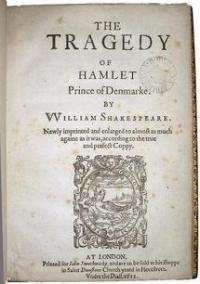New Shakespeare Archive launched

(PhysOrg.com) -- The Shakespeare Quartos Archive has been officially launched today with a complete digital collection of rare early editions of Hamlet.
For the first time, all 32 existing quarto copies of the play held by participating UK and US institutions are freely available online in one place (www.quartos.org). This initiative is jointly led by the Bodleian Library, University of Oxford, and the Folger Shakespeare Library, Washington DC, through a joint transatlantic grant from JISC in the UK and the National Endowment for the Humanities in the US.
Quarto is a technical term describing the format of a book, referring to the size of leaves produced from folding a full sheet of paper on which multiple pages of text were printed to form the individual sections of a book.
The new website features high-quality reproductions and searchable full text of surviving copies of Shakespeare’s Hamlet in quarto in an interactive interface. Functions and tools - such as the ability to overlay images, compare them side-by-side, and mark and tag features with user annotations - facilitate scholarly research, performance studies, and new applications for learning and teaching.
Controversy surrounds Hamlet as there were several different versions published before theatres were closed in 1642. The most significant differences are between the first folio, and the first and second quartos. For example, in the former, Hamlet’s famous soliloquy appears in a different scene and begins, 'To be, or not to be, I there’s the point / To die, to sleep, is that all? I all,' and the edition documents an entire scene not present elsewhere. Meanwhile the latter is almost twice the length, with various additions including a new soliloquy for Hamlet. Now scholars can explore these different quarto versions side by side for the first time on the project website.
The project, which began in April 2008, reunites all 75 pre-1642 quarto editions of Shakespeare’s plays into a single online collection. The prototype interface is at present fully functional only for Hamlet, but the Shakespeare Quartos Archive plans to apply this technology to all the plays in quarto, and to seek involvement from new partner institutions.
Richard Ovenden, Associate Director and Keeper of Special Collections, Bodleian Library, said: ‘The Bodleian Library has been delighted to lead the UK side of this international partnership. Together with our partner institutions we have brought together all the existing quarto editions of Shakespeare's plays in one place. Featuring a set of innovative interactive tools, this digital resource will also open new ways of accessing and researching the original texts of Hamlet. We are confident that the Shakespeare Quartos Archive will become an indispensable online resource for the worldwide community of scholars, teachers and students with an interest in Shakespeare. It is a valuable addition to the increasing number of Bodleian's digital collections.’
Gail Kern Paster, Director of the Folger Shakespeare Library, said: ‘The Shakespeare Quartos Archive presents new and innovative opportunities that were simply unavailable before for scholars, teachers, and students to explore Hamlet.’
In the absence of surviving manuscripts, the quartos - Shakespeare’s earliest printed editions - offer the closest known evidence of what Shakespeare might actually have written, and what appeared on the early modern English stage.
Alastair Dunning, Digitisation Programme Manager at JISC, said: ‘Early copies of Shakespeare's plays are now scattered across the world's great libraries and viewing each one in person would be a monumental task. However, international projects such as the Shakespeare Quartos Archive provide a valuable opportunity for such collections to be reunited and re-examined in their entirety.’
The Shakespeare Quartos Archive contains texts drawn from the British Library, the Folger Shakespeare Library, the Huntington Library, the National Library of Scotland, and the University of Edinburgh Library, in addition to the Bodleian Library. These six institutions worked in conjunction with the Maryland Institute for Technology in the Humanities at the University of Maryland, and The Shakespeare Institute at the University of Birmingham, to digitize and transcribe 32 copies of Hamlet.
Provided by Oxford University (news : web)

















